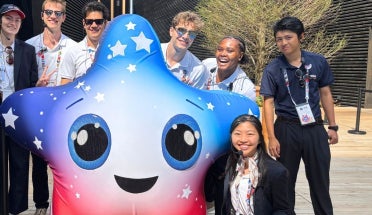
Freeman Scholarship Empowers Cross-Cultural Exploration in Singapore
- Oct 24, 2023
- Global Alumni Relations
- by Kayla Johnson
Growing up the youngest of six children in a vibrant Nigerian-American household outside of Austin, Whitney Nwaneri constantly grappled with others’ expectations. She was accustomed to following in her older siblings’ footsteps, and since three of them had already attended The University of Texas at Austin, it seemed natural that she’d become a Longhorn, as well.
“I didn’t have any big plans for college, and I already had automatic admission,” Nwaneri said. “So, I figured I’d go to UT.”
As expected, she did exactly that. But during the summer of 2022, Nwaneri finally got to step out of her comfort zone and forge her own path when she was approved for an internship in Southeast Asia.
The third-year psychology major spent the entire summer break excitedly preparing for her awaited adventures — but the abrupt resurgence of the COVID-19 pandemic stopped her plans in their tracks. After numerous complications, Nwaneri prepared to switch to a program in Lisbon, Portugal.
Soon after, though, everything changed again when Nwaneri received an unexpected notification: She had been awarded the prestigious Freeman Scholarship for Internships in Asia to support her time abroad. The scholarship only supports programs in Asia, so Nwaneri switched her destination again, this time to the tropical island of Singapore.
Freeman Foundation: Supporting Interest and Education in East Asia
The Freeman Foundation aims to create a strong bond of friendship between the United States and countries in East Asia to foster greater appreciation for East Asian countries through economic and cultural exchange. The Freeman Scholarship advances this mission by funding undergraduate and graduate students to complete internships in these countries.
Since 2012, more than 280 UT Austin students have been named Freeman Scholars, strengthening their cultural competencies and professional skills by working in Cambodia, China, Indonesia, Japan, Malaysia, the Philippines, Singapore and South Korea, among other countries.
To her surprise, Nwaneri received her acceptance letter for the internship abroad program on her birthday, which she called “the best birthday present” in her thank-you note to the foundation. With her anxieties about affording study abroad eased, she could direct her thoughts toward her internship and the once-in-a-lifetime opportunities ahead of her.
As proud and relieved as she was to have her travels supported, a different kind of anxiety soon set in: Now, she was preparing to travel to a country about which she knew next to nothing.
Adjusting to a New Culture of Work
Home to an array of culinary delights, stunning modern architecture, lush green spaces, and vibrant cultural festivals and attractions, Singapore is brimming with vacation appeal. In addition to its booming tourism industry, the country is also a leading financial center in the Asia-Pacific region.
Nwaneri worked at a local tech startup, learning the ins and outs of user interface (UI), user experience (UX) and customer satisfaction. Her first task was to evaluate the company’s platform and provide feedback on how it could be more effectively organized. Nwaneri also worked with the marketing team, creating videos and advertisements as well as blog posts for the company website.
Both of Nwaneri’s supervisors were from India, and she found it hard to understand their sense of humor at first. The cultural differences were pronounced in nonverbal communication, and even the verbal communication was completely different from what she was used to.
“I felt like my social cues were gone,” Nwaneri said.
The company’s customers were also from other places around the world, including China, India and Nigeria. Nwaneri said learning to respond to international customers effectively taught her how to adapt to and thrive in a multicultural environment. By the end of her internship, she was laughing along with her colleagues.
“That was the biggest thing I learned — cross-cultural communication and how to navigate that better,” Nwaneri said.
Encountering Cultural Differences
Outside of work, Nwaneri broadened her horizons by hiking, visiting Sentosa Island off the southern coast of Singapore, and even traveling to Malaysia. Since there were only four other people in her program, they bonded quickly. She and her friends enjoyed Singapore’s efficient public transportation while exploring the city, shopping and trying out new food together.
In the course of these adventures, Nwaneri had the chance to interact with Singaporeans, who were more reserved than she was accustomed to. Having grown up in Texas, she said, she’d always operated within an atmosphere of “southern hospitality” that included a certain level of accessibility, sometimes even with strangers. In the U.S., she could walk up to anyone and start a conversation, even if it felt a little awkward at first.
“In Singapore, maybe I could do that, but I think it’s just not the same,” Nwaneri said. “People won’t come up to you and start a conversation.”
Nwaneri said she’d already had some experience in navigating cultural differences and misconceptions, growing up as she did between two distinct cultures. She cited a lot of solidarity among Nigerians and Africans at UT Austin but also attested that she hadn’t always experienced that kind of understanding environment.
Nwaneri grew up in Round Rock with mostly white peers, and she often dealt with others’ ignorance of her identity, as well as her own impostor syndrome as a result. She drew parallels between the reserve she initially perceived in Singapore and the way that people unfamiliar with Nigerian culture might first react to it.
But she discovered happier similarities, too, when she learned that Nigerians and Singaporeans share a similar accent when speaking English. One day while eating in a diner, she heard what sounded like a fellow Nigerian. Excited for a potential conversation, she turned around — and realized it was actually a local speaking.
“They sound exactly the same!” Nwaneri laughed, remembering how surprised she was.
Making Study Abroad Possible
After their time abroad, Freeman Scholars must complete a project that shares their experiences with their home campuses or communities, which serves to promote greater understanding of Asian culture and encourage other students to study abroad. For her project, Nwaneri participated in a Freeman alumni panel and shared the many lessons she learned while in Singapore.
Nwaneri said that going abroad can be “really intense,” but upon returning to the U.S., she found that many of the situations that used to cause her social anxiety didn’t seem as daunting now.
“I think it’s a big self-esteem booster if you can go abroad and survive being on your own,” she said.
Though she had saved up a lot of money, Nwaneri said it had been hard initially to justify the expense of her trip, considering that her internship was unpaid. But she said the Freeman Scholarship alleviated those worries, instilling her with confidence and allowing her to become the first among her siblings to study abroad.
Aside from finances, Nwaneri said the greatest barrier to studying abroad for most people is mental. Before her departure to Singapore, she said, the whole thing felt impossible. But the Freeman Scholarship program coordinator connected her with another Black alumna who had studied abroad, and hearing their story — of someone like herself having a positive experience — gave her peace of mind.
Now that she knows it’s possible, Nwaneri said she would love to go abroad again, for a program related to psychology or sociology. It’s on her radar to pursue a Ph.D., so she is considering pursuing postgraduate studies overseas. She encouraged others interested in studying abroad to reach out to those who’ve already done it.
“My advice would be to find other people who went abroad and talk to them,” Nwaneri said. “You really just need someone helping you and telling you that you can do it.”



